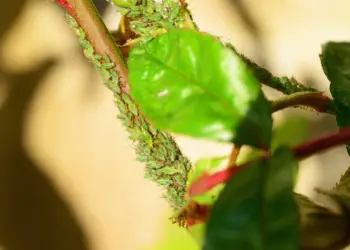Getting aphids on miniature roses? Miniature roses can suffer from pests as much as any other rose.
If you’re concerned about aphids attacking your miniature roses then in this article, I’m going through when it will start, how they attack, what they will do to your miniature roses and some solutions on how to deal with them effectively before and during the infestation.
Here’s a quick rundown then we’ll get into the detail…
For aphids on miniature roses, check your roses regularly from early spring. They can damage miniature roses the same as they can any other roses. You can remove them manually, introduce aphid predators, use pesticide sprays or use homemade remedies to tackle them such as a vinegar mix.
Aphids on miniature roses
I thought it would be helpful to focus this article on miniature roses, because, unlike other roses, they can sometimes be easier to deal with, and offer additional solutions.
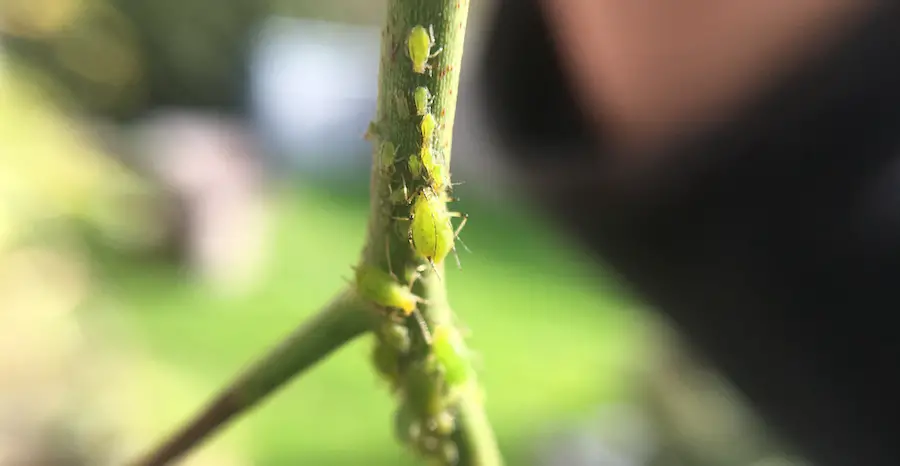
What are aphids?
In case this is your first encounter. Aphids are small, soft-bodied insects that can be either winged or wingless.
They come in a variety of colors depending on the species, but they’re most commonly green, black, or brown.
There are many different types of aphids, but the most common ones that attack miniature roses to look out for are:
- Rose aphid – (Macrosiphum rosae) is the rose aphid. These small, pear-shaped insects are usually green, but can also be pink, red, or black. The rose aphid is more common in North America and is also the most damaging to miniature roses.
- Green peach aphid – (Myzus persicae). The green peach aphid is found worldwide. One female green peach aphid can lay 500 eggs in her lifetime, which is why this aphid is considered one of the most damaging pests to crops. These small, oval-shaped insects are usually green but can also be pink or yellow. The green peach aphid is more common in Europe and Asia and attacks a wide variety of plants, not just miniature roses.
Roses can handle a certain amount of aphid abuse! And often nature offers her usual balance.
So sometimes having aphids simply attracts more natural predators. It’s when there are fewer predators and a growing population of aphids that the problem develops.
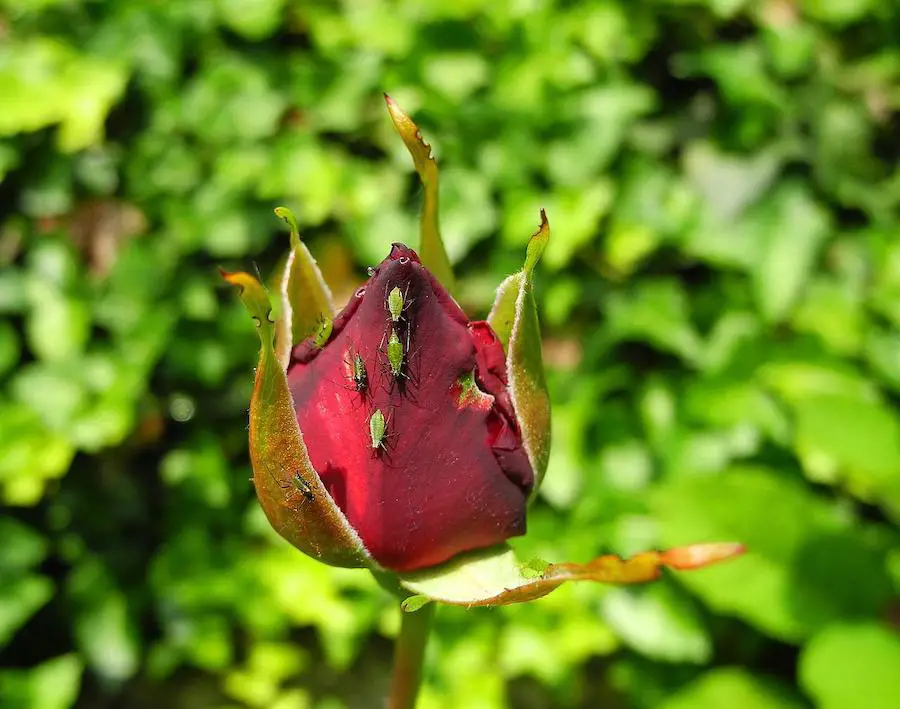
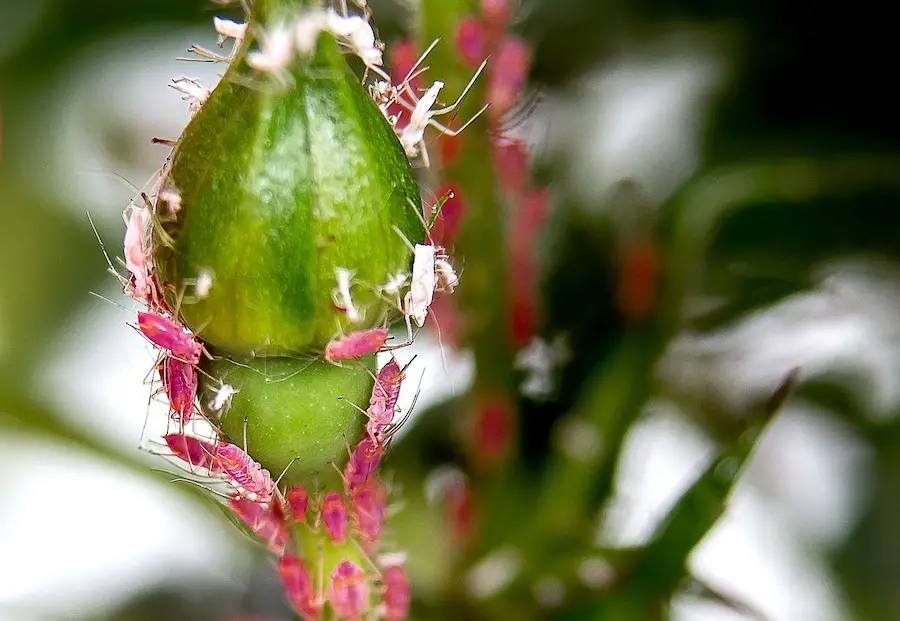
When do aphids appear?
The most common time of year to find aphids on roses is in late spring or early summer, but they can appear any time during the growing season.
However, aphids are clever and will prepare in advance.
They will spawn prior to the new Spring season, and the eggs will overwinter in plant debris or on the undersides of leaves.
They will hatch in the early spring, and the nymphs will soon begin feeding on the new growth of roses.
Aphids can mature in as little as two weeks and can produce up to eight generations in a single season.
They don’t just stop at roses. Occasionally an aphid is produced that can fly. This aphid will migrate to your other plants and start a new colony there too. Not good!
How aphids attack miniature roses
Aphids will attack miniature roses as much as any other roses …during any stage of growth, but they’re especially fond of new growth.
The aphids pierce the plant tissue with their mouthparts and suck out the sap. This starves the rose of nutrients and can cause the rose some problems – which we’ll come to shortly.
Aphids also secrete a sticky substance called honeydew, which can attract other pests such as ants. Ants then “farm” the aphids, offering protection in return for honeydew. It’s known as a symbiotic relationship.
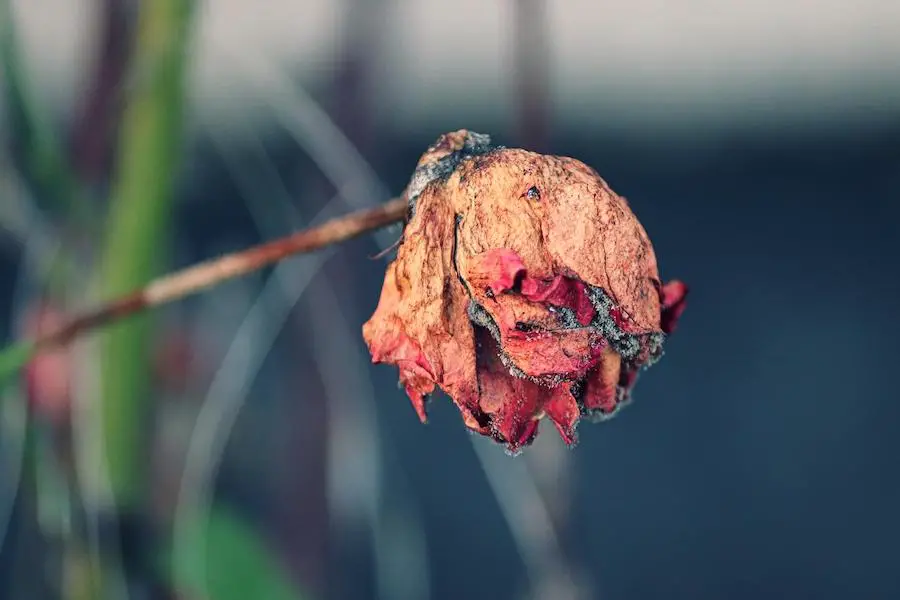
Symptoms – how to tell aphids are eating your miniature roses
All varieties of miniature roses can be affected by aphids. If you see any of the following signs, it’s likely that aphids are attacking your miniature roses:
- Wilting leaves
- Yellowing of leaves
- Distortion of new growth
- Stunt growth
- Black spot on leaves
- Deformed flowers
The effect that aphids have on miniature roses
Aphids can cause a great deal of damage to miniature roses if left unchecked. They suck the sap out of new growth, which can stunt the growth of the plant.
In heavy infestations, aphids can cause leaves to yellow and wilt, and eventually die.
Aphids can also spread diseases from one plant to another as they feed. The most common disease associated with aphids is black spot, which will cause the leaves of your rose to turn black and fall off.
They will also attack the buds of your miniature roses, which can prevent them from opening.
By the time early summer comes they will be reproducing rapidly, so remain vigilant during this period.
What happens if aphids are not treated
If left untreated, aphids can cause serious damage to your roses. as their numbers increase – and they will, they can seriously weaken and even kill your rose.
They can also spread diseases from your miniature rose to other plants.
In many cases, you can revive a mini rose. I’ve got an article on how to bring a mini rose back to life!
How to deal with aphids on miniature roses
The best time to apply treatment for aphids is in the early spring before they have a chance to lay their eggs. However, if you see them on your plants at any time, you should take steps to get rid of them.
There are various ways to control aphids on roses…
Introduce predators such as Ladybugs
You can introduce predators such as ladybugs into your garden. Ladybugs are extremely effective, they are voracious feeders and aphids are their favorite meal.
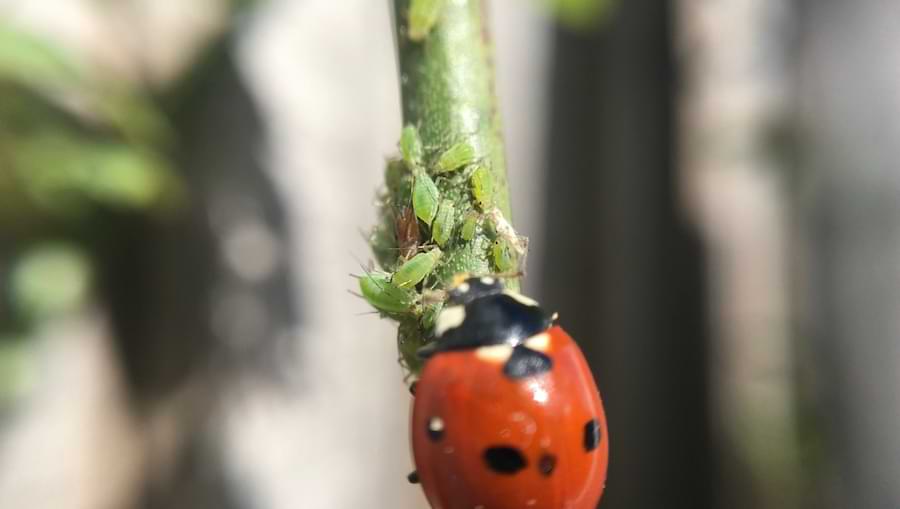
You will only need a few, once they are near a colony of aphids they will likely attract mates and breed anyway.
If you cannot find any ladybugs then you can order them online. Then just release them onto the miniature rose and they will decimate the aphid population.
You can also look for Ladybug larvae. Because they will eventually become Ladybugs and are still growing, they can become more ferocious than ladybugs themselves!
They look quite different from ladybugs, and like Ladybugs, they come in different colors including yellow! So you might not know it as a ladybug junior!
But here’s an example of a common one…
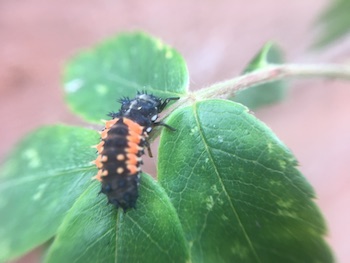
The advantage of a miniature rose with this solution is that miniature roses are small enough to throw a cover over them. This prevents the ladybugs from simply flying away. Leave it on for a day or two and this should solve the problem.
Green lacewings are also a great aphid predator if you can entice those into the garden.
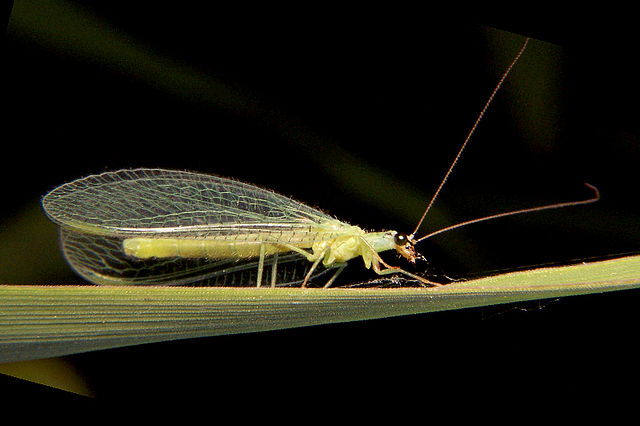
Insecticide sprays
You can also spray the plants, but avoid spraying them with water as this will only spread the aphids around and can also cause fungal diseases with excess moisture.
There are a number of insecticidal soaps and oils that will kill aphids, but you need to be careful not to damage your roses during treatment.
If you’re going down this route then here are some homemade solutions you might want to try…
- Insecticidal soap solution
- Liquid Dish Soap Spray
- Neem Oil
- Rubbing alcohol
- Horticultural Oils
- Diatomaceous Earth
- Botanical Sprays
Remove aphids manually
You can also remove them by hand. This is best done in the morning when they are most active.
You can simply squish them with your fingers (with gloves on is preferable!). This is easily done if there are only a few of them, but check regularly every morning and perform the practice.
Relocate miniature rose containers
Aphids on miniature roses or Miniflora roses that are planted in containers can be easier to deal with than aphid infestations in your rose beds.
You can separate out the infected containers and isolate them somewhere until you’ve solved the issue.
It also allows you to take them indoors to deal with the problem in isolation.
This way, you might be able to avoid using pesticides or chemicals that might harm beneficial insects in your garden.
Here’s more information on where yo put your miniature roses.
Aphid-repelling plants
If you are struggling with aphids on your miniature roses, try planting around the base of the plant with one of these plants:
- Catnip
- Chrysanthemums
- Garlic
- Marigolds
- Nasturtiums
- Mint
- Rue
- Rosemary
- Basil
These plants all have a natural defense against aphids and will help to keep them away from your roses.
You can also try planting these around the perimeter of your garden to create a barrier between your roses and the aphids.
Check my list of best rose companion plants for more companions that will repel aphids.
Let’s highlight a couple of the more natural ways to remove aphids other than by hand.
Using vinegar on miniature roses
If you want to look at using a natural remedy to spray on, then try using vinegar.
Take a bowl and mix one part water with one part vinegar, add a few drops of dish soap, and then pour it into a spray bottle.
Spray this mixture on the aphids and be sure to get under the leaves where they are hiding.
The reason for the mix is that the acidity in the vinegar will kill the aphids and the dish soap will help it to stick to the plant and not just run off.
This method should not be used on hot days as it can damage the leaves of the miniature roses.
Homemade insecticidal soap for miniature roses
To make your own insecticidal soap spray mix one tablespoon of
- One gallon of water
- One tablespoon of Ivory dish soap or Castile soap
- One tablespoon of canola oil or vegetable oil
Mix all the ingredients together and put them in a clean spray bottle.
Spray the mixture on the aphids making sure to get both sides of the leaves. You will need to reapply this every few days until the aphids are gone as it does not last long and only kills the aphids that it comes in contact with.
If you have a large infestation of aphids, you can also add two tablespoons of cayenne pepper or tobacco to the mix. These will act as deterrents to keep the aphids away.
If you really want to see ladybugs and aphids in action, then here’s a video I took of a ladybug eating the aphids on my rose bush!
Here are some related articles you might like…
Aphids on miniature roses ~ More roses help!
More roses make a more beautiful garden, but they also provide more places for aphids to hide. Be sure to check the undersides of leaves and stems for these tiny pests.
Sadly, the more roses you have, the more checking there is to do. But then what better place to spend a summer day than in your rose garden?
Now that you know what to look for, and how to rid your roses of aphids, go out and enjoy the fragrance and beauty of these lovely flowers. Just be sure to keep an eye out for those pesky aphids!

Hi, I’m Michael. My passion for roses was sparked a few years ago after visiting a dedicated community rose garden. So Rosehow.com represents my take, my learnings, and my help for anyone looking to grow, be proud of, and harvest roses.

